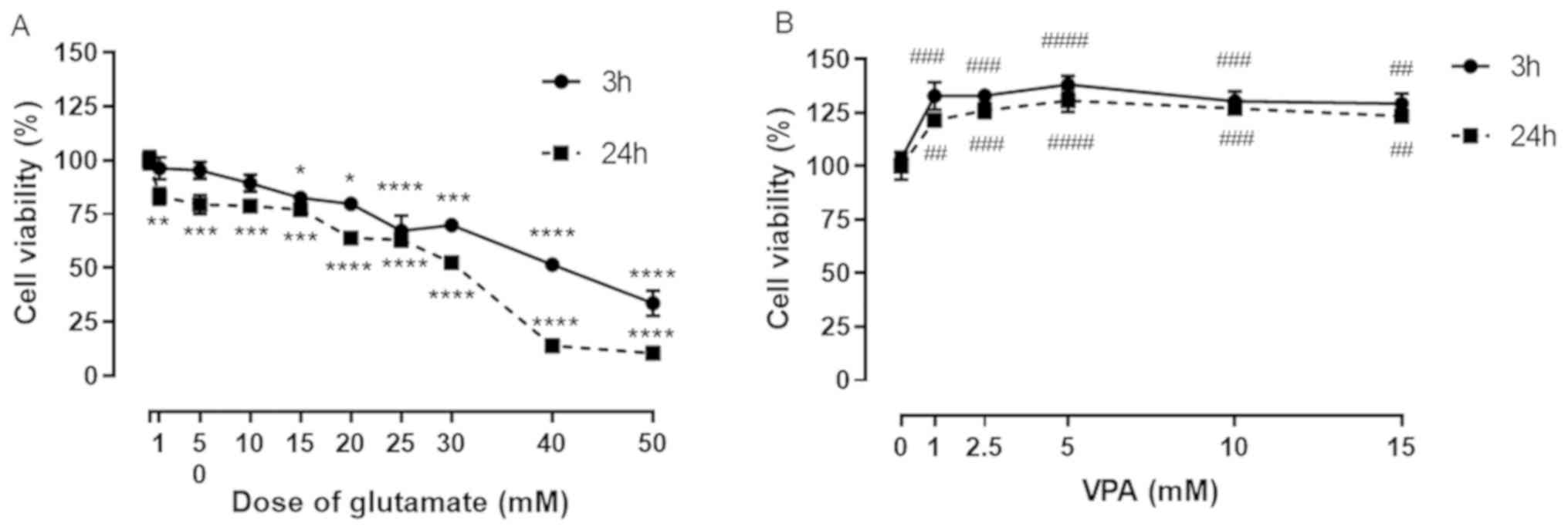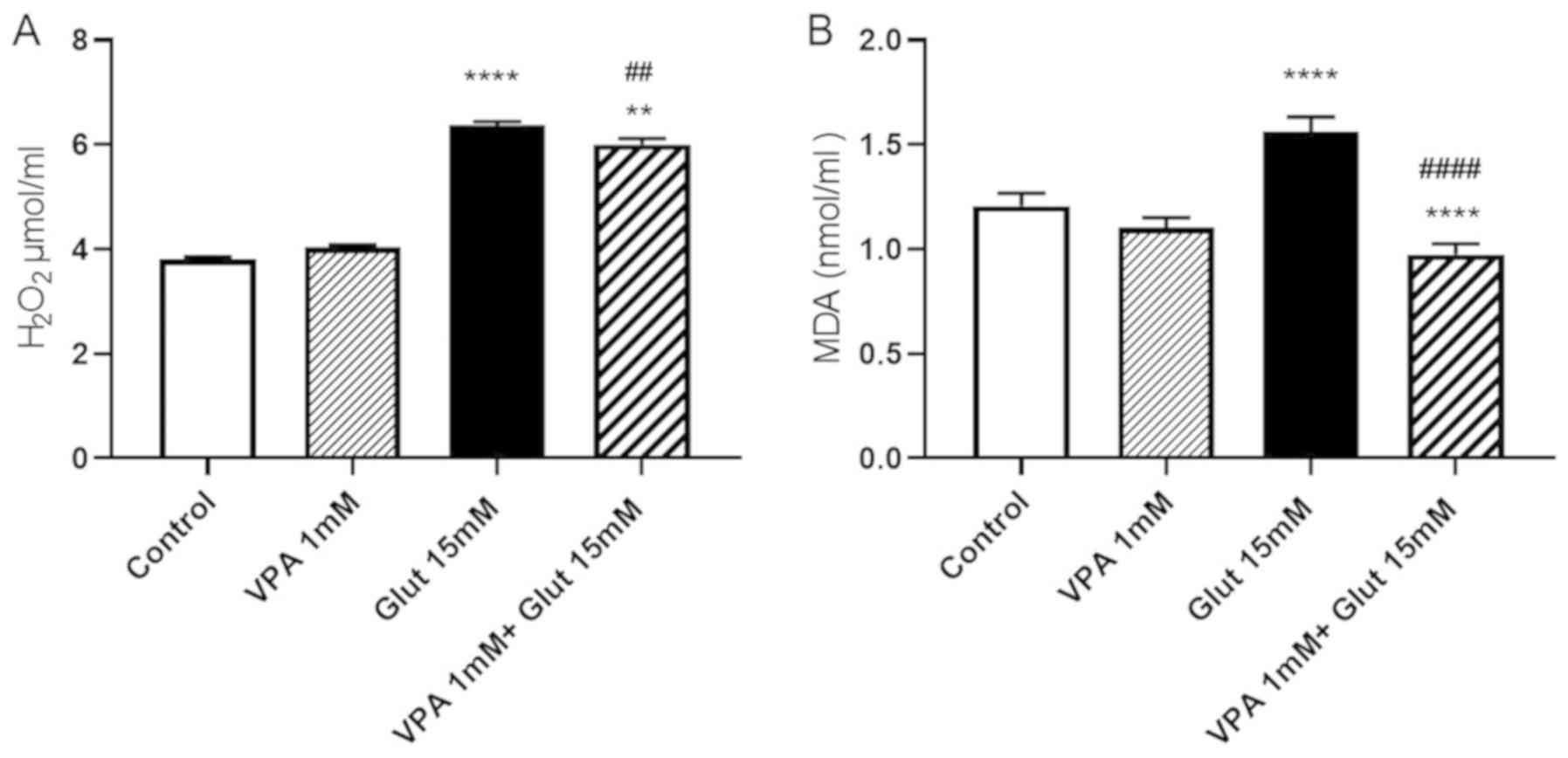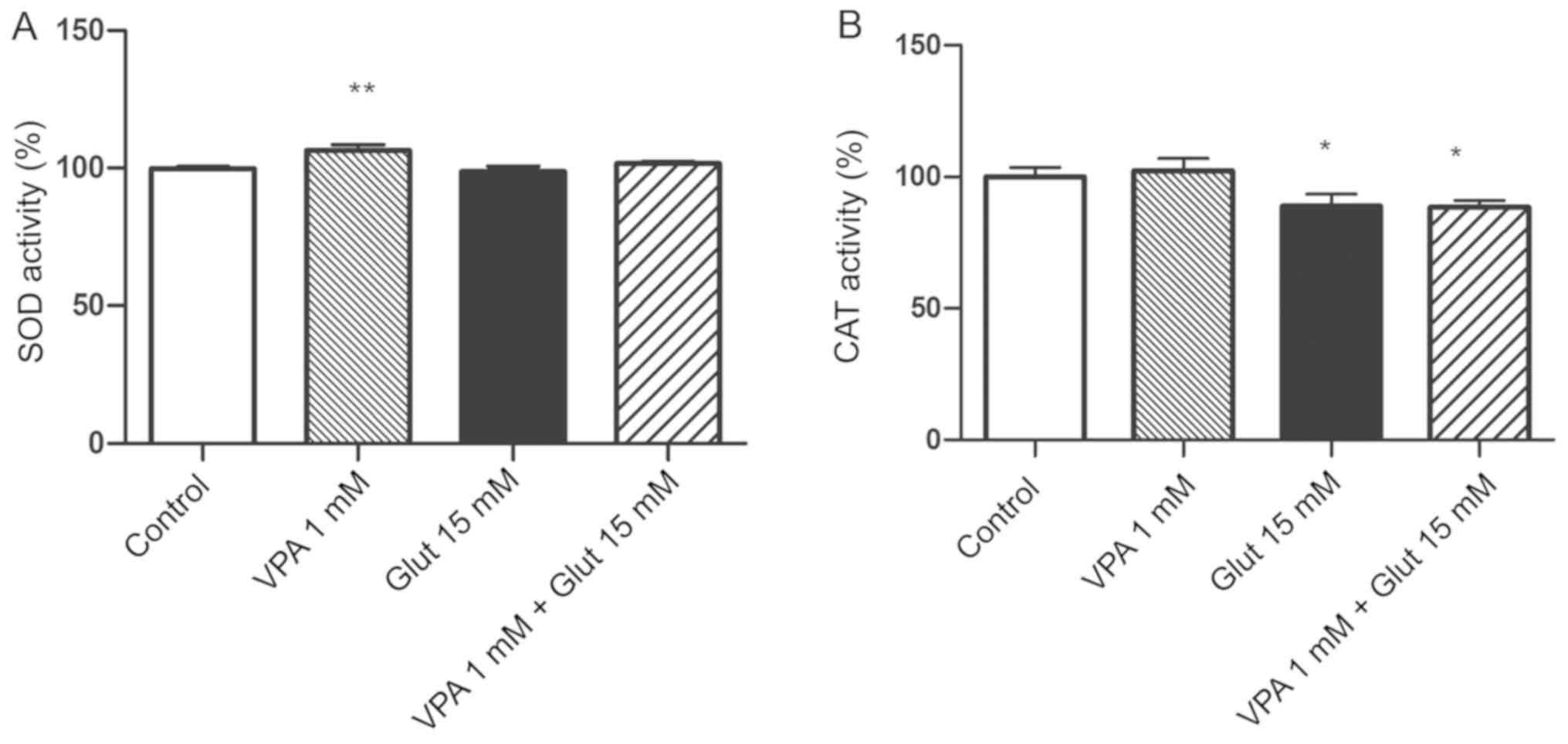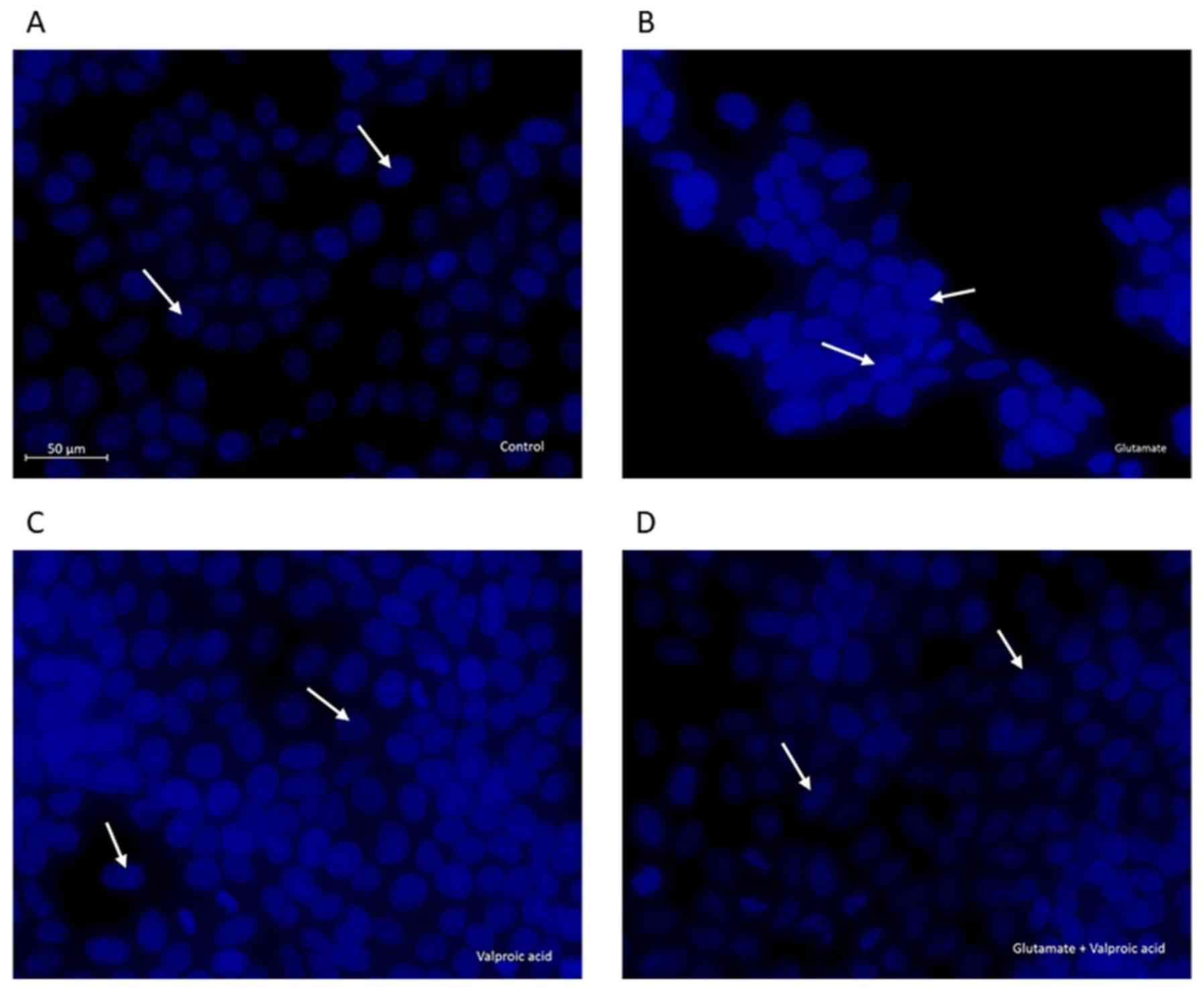|
1
|
Wang R and Reddy PH: Role of Glutamate and
NMDA receptors in Alzheimer's disease. J Alzheimers Dis.
57:1041–1048. 2017.PubMed/NCBI View Article : Google Scholar
|
|
2
|
Bleich S, Römer K, Wiltfang J and
Kornhuber J: Glutamate and the glutamate receptor system: A target
for drug action. Int J Geriatr Psychiatry. 18 (Suppl 1):S33–S40.
2003.PubMed/NCBI View
Article : Google Scholar
|
|
3
|
Schubert D and Piasecki D: Oxidative
glutamate toxicity can be a component of the excitotoxicity
cascade. J Neurosci. 21:7455–7462. 2001.PubMed/NCBI View Article : Google Scholar
|
|
4
|
Kritis AA, Stamoula EG, Paniskaki KA and
Vavilis TD: Researching glutamate-induced cytotoxicity in different
cell lines: A comparative/collective analysis/study. Front Cell
Neurosci. 9(91)2015.PubMed/NCBI View Article : Google Scholar
|
|
5
|
Andersen JK: Oxidative stress in
neurodegeneration: Cause or consequence? Nat Med. 10 (Supp
l):S18–S25. 2004.PubMed/NCBI View
Article : Google Scholar
|
|
6
|
Venkateshappa C, Harish G, Mythri RB,
Mahadevan A, Bharath MM and Shankar SK: Increased oxidative damage
and decreased antioxidant function in aging human substantia nigra
compared to striatum: Implications for Parkinson's disease.
Neurochem Res. 37:358–369. 2012.PubMed/NCBI View Article : Google Scholar
|
|
7
|
Kumar A, Singh RL and Babu GN: Cell death
mechanisms in the early stages of acute glutamate neurotoxicity.
Neurosci Res. 66:271–278. 2010.PubMed/NCBI View Article : Google Scholar
|
|
8
|
Floyd RA: Antioxidants, oxidative stress,
and degenerative neurological disorders. Proc Soc Exp Biol Med.
222:236–245. 1999.PubMed/NCBI View Article : Google Scholar
|
|
9
|
Calabrese V, Scapagnini G, Giuffrida
Stella AM, Bates TE and Clark JB: Mitochondrial involvement in
brain function and dysfunction: Relevance to aging,
neurodegenerative disorders and longevity. Neurochem Res.
26:739–764. 2001.PubMed/NCBI View Article : Google Scholar
|
|
10
|
Atlante A, Calissano P, Bobba A,
Giannattasio S, Marra E and Passarella S: Glutamate neurotoxicity,
oxidative stress and mitochondria. FEBS Lett. 497:1–5.
2001.PubMed/NCBI View Article : Google Scholar
|
|
11
|
Aoyama K and Nakaki T: Inhibition of
GTRAP3-18 may increase neuroprotective glutathione (GSH) synthesis.
Int J Mol Sci. 13:12017–12035. 2012.PubMed/NCBI View Article : Google Scholar
|
|
12
|
Vajda FJ: Valproate and neuroprotection. J
Clin Neurosci. 9:508–514. 2002.PubMed/NCBI View Article : Google Scholar
|
|
13
|
Shao L, Young LT and Wang JF: Chronic
treatment with mood stabilizers lithium and valproate prevents
excitotoxicity by inhibiting oxidative stress in rat cerebral
cortical cells. Biol Psychiatry. 58:879–884. 2005.PubMed/NCBI View Article : Google Scholar
|
|
14
|
Pang T, Wang YJ, Gao YX, Xu Y, Li Q, Zhou
YB, Xu L, Huang ZJ, Liao H, Zhang LY, et al: A novel GSK-3β
inhibitor YQ138 prevents neuronal injury induced by glutamate and
brain ischemia through activation of the Nrf2 signaling pathway.
Acta Pharmacol Sin. 37:741–752. 2016.PubMed/NCBI View Article : Google Scholar
|
|
15
|
Silva MR, Correia AO, Dos Santos GCA,
Parente LLT, de Siqueira KP, Lima DGS, Moura JA, da Silva Ribeiro
AE, Costa RO, Lucetti DL, et al: Neuroprotective effects of
valproic acid on brain ischemia are related to its HDAC and GSK3
inhibitions. Pharmacol Biochem Behav. 167:17–28. 2018.PubMed/NCBI View Article : Google Scholar
|
|
16
|
Chen S, Wu H, Klebe D, Hong Y and Zhang J:
Valproic acid: A new candidate of therapeutic application for the
acute central nervous system injuries. Neurochem Res. 39:1621–1633.
2014.PubMed/NCBI View Article : Google Scholar
|
|
17
|
Sun ZW, Zhang L, Zhu SJ, Chen WC and Mei
B: Excitotoxicity effects of glutamate on human neuroblastoma
SH-SY5Y cells via oxidative damage. Neurosci Bull. 26:8–16.
2010.PubMed/NCBI View Article : Google Scholar
|
|
18
|
Uttara B, Singh AV, Zamboni P and Mahajan
RT: Oxidative stress and neurodegenerative diseases: A review of
upstream and downstream antioxidant therapeutic options. Curr
Neuropharmacol. 7:65–74. 2009.PubMed/NCBI View Article : Google Scholar
|
|
19
|
Lobysheva NV, Selin AA, Vangeli IM,
Byvshev IM, Yaguzhinsky LS and Nartsissov YR: Glutamate induces
H2O2 synthesis in nonsynaptic brain mitochondria. Free Radic Biol
Med. 65:428–435. 2013.PubMed/NCBI View Article : Google Scholar
|
|
20
|
Ha JS, Lim HM and Park SS: Extracellular
hydrogen peroxide contributes to oxidative glutamate toxicity.
Brain Res. 1359:291–297. 2010.PubMed/NCBI View Article : Google Scholar
|
|
21
|
Maes M, Mihaylova I, Kubera M,
Uytterhoeven M, Vrydags N and Bosmans E: Increased plasma peroxides
and serum oxidized low density lipoprotein antibodies in major
depression: Markers that further explain the higher incidence of
neurodegeneration and coronary artery disease. J Affect Disord.
125:287–294. 2010.PubMed/NCBI View Article : Google Scholar
|
|
22
|
Frey BN, Valvassori SS, Réus GZ, Martins
MR, Petronilho FC, Bardini K, Dal-Pizzol F, Kapczinski F and
Quevedo J: Effects of lithium and valproate on amphetamine-induced
oxidative stress generation in an animal model of mania. J
Psychiatry Neurosci. 31:326–332. 2006.PubMed/NCBI
|
|
23
|
Lee JY, Maeng S, Kang SR, Choi HY, Oh TH,
Ju BG and Yune TY: Valproic acid protects motor neuron death by
inhibiting oxidative stress and endoplasmic reticulum
stress-mediated cytochrome C release after spinal cord injury. J
Neurotrauma. 31:582–594. 2014.PubMed/NCBI View Article : Google Scholar
|
|
24
|
Xuan A, Long D, Li J, Ji W, Hong L, Zhang
M and Zhang W: Neuroprotective effects of valproic acid following
transient global ischemia in rats. Life Sci. 90:463–468.
2012.PubMed/NCBI View Article : Google Scholar
|
|
25
|
Valerio A, Bertolotti P, Delbarba A,
Perego C, Dossena M, Ragni M, Spano P, Carruba MO, De Simoni MG and
Nisoli E: Glycogen synthase kinase-3 inhibition reduces ischemic
cerebral damage, restores impaired mitochondrial biogenesis and
prevents ROS production. J Neurochem. 116:1148–1159.
2011.PubMed/NCBI View Article : Google Scholar
|
|
26
|
Wang JF, Azzam JE and Young LT: Valproate
inhibits oxidative damage to lipid and protein in primary cultured
rat cerebrocortical cells. Neuroscience. 116:485–489.
2003.PubMed/NCBI View Article : Google Scholar
|
|
27
|
Brookes PS, Yoon Y, Robotham JL, Anders MW
and Sheu SS: Calcium, ATP, and ROS: A mitochondrial love-hate
triangle. Am J Physiol Cell Physiol. 287:C817–C833. 2004.PubMed/NCBI View Article : Google Scholar
|
|
28
|
Liu H, Bowes RC, van de Water B, Sillence
C, Nagelkerke JF and Stevens JL: Endoplasmic reticulum chaperones
GRP78 and calreticulin prevent oxidative stress, Ca2+ disturbances,
and cell death in renal epithelial cells. J Biol Chem.
272:21751–21759. 1997.PubMed/NCBI View Article : Google Scholar
|
|
29
|
Halliwell B: Free radicals and
antioxidants-quo vadis? Trends Pharmacol Sci. 32:125–130.
2011.PubMed/NCBI View Article : Google Scholar
|
|
30
|
Ďuračková Z: Free radicals and
antioxidants for Non-experts. In: Systems Biology of Free Radicals
and Antioxidants. Laher I (ed). Springer, Berlin, Heidelberg,
pp3-38, 2014.
|
|
31
|
Jornada LK, Valvassori SS, Steckert AV,
Moretti M, Mina F, Ferreira CL, Arent CO, Dal-Pizzol F and Quevedo
J: Lithium and valproate modulate antioxidant enzymes and prevent
ouabain-induced oxidative damage in an animal model of mania. J
Psychiatr Res. 45:162–168. 2011.PubMed/NCBI View Article : Google Scholar
|
|
32
|
Dringen R, Pawlowski PG and Hirrlinger J:
Peroxide detoxification by brain cells. J Neurosci Res. 79:157–165.
2005.PubMed/NCBI View Article : Google Scholar
|
|
33
|
Yasui K and Baba A: Therapeutic potential
of superoxide dismutase (SOD) for resolution of inflammation.
Inflamm Res. 55:359–363. 2006.PubMed/NCBI View Article : Google Scholar
|
|
34
|
Chadwick W, Zhou Y, Park SS, Wang L,
Mitchell N, Stone MD, Becker KG, Martin B and Maudsley S: Minimal
peroxide exposure of neuronal cells induces multifaceted adaptive
responses. PLoS One. 5(e14352)2010.PubMed/NCBI View Article : Google Scholar
|
|
35
|
Halliwell B: Oxidative stress and
neurodegeneration: Where are we now? J Neurochem. 97:1634–1658.
2006.PubMed/NCBI View Article : Google Scholar
|
|
36
|
Kapczinski F, Frey BN, Andreazza AC,
Kauer-Sant'Anna M, Cunha AB and Post RM: Increased oxidative stress
as a mechanism for decreased BDNF levels in acute manic episodes.
Br J Psychiatry. 30:243–245. 2008.PubMed/NCBI View Article : Google Scholar
|
|
37
|
Wilson JX: Antioxidant defense of the
brain: A role for astrocytes. Can J Physiol Pharmacol.
75:1149–1163. 1997.PubMed/NCBI
|
|
38
|
Savolainen H: Superoxide dismutase and
glutathione peroxidase activities in rat brain. Res Commun Chem
Pathol Pharmacol. 21:173–176. 1978.PubMed/NCBI
|
|
39
|
Chaudhary S and Parvez S: An in vitro
approach to assess the neurotoxicity of valproic acid-induced
oxidative stress in cerebellum and cerebral cortex of young rats.
Neuroscience. 225:258–268. 2012.PubMed/NCBI View Article : Google Scholar
|
|
40
|
Zhang Y, Wu JY, Weng LH, Li XX, Yu LJ and
Xu Y: Valproic acid protects against MPP+-mediated
neurotoxicity in SH-SY5Y Cells through autophagy. Neurosci Lett.
638:60–68. 2017.PubMed/NCBI View Article : Google Scholar
|
|
41
|
Sołowiej E and Sobaniec W: The effect of
antiepileptic drug therapy on antioxidant enzyme activity and serum
lipid peroxidation in young patients with epilepsy. Neurol
Neurochir Pol. 37:991–1003. 2003.PubMed/NCBI(In Polish).
|
|
42
|
Yiş U, Seçkin E, Kurul SH, Kuralay F and
Dirik E: Effects of epilepsy and valproic acid on oxidant status in
children with idiopathic epilepsy. Epilepsy Res. 84:232–237.
2009.PubMed/NCBI View Article : Google Scholar
|
|
43
|
Wang JF, Shao L, Sun X and Young LT:
Glutathione S-transferase is a novel target for mood stabilizing
drugs in primary cultured neurons. J Neurochem. 88:1477–1484.
2004.PubMed/NCBI View Article : Google Scholar
|



















